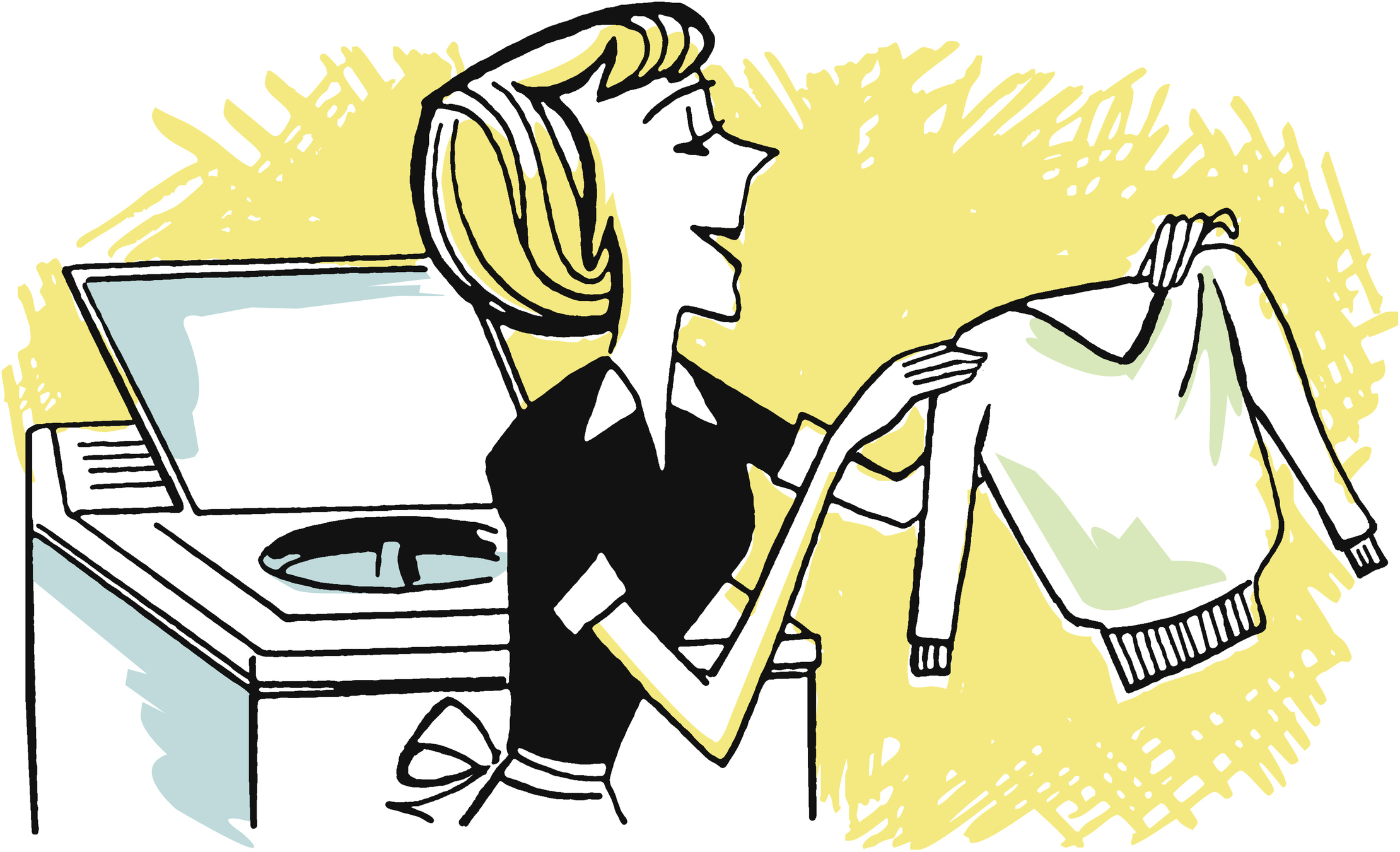This week, Kansas City Chiefs kicker Harrison Butker drew fire for comments he made during a graduation speech at Benedictine College. Among other things, Butker encouraged young female graduates to reject the “diabolical lies” about the importance of careers and embrace “one of the most important titles of all: homemaker.” Given Butker’s devout Catholicism, it would be easy to explain his perspective as religious fervor—easy, that is, if the physical embodiment of Butker’s words didn’t show up on social media every day in the form of the #tradwife.
Short for “traditional wife,” the tradwife is a woman who forgoes a professional career to devote herself exclusively to being a wife, mother, and homemaker. Follow the hashtags #housewifelife or #homemaker on Instagram and Tiktok and you’ll see young women in flowing dresses, baking the family’s morning sourdough loaf, homeschooling a passel of children, or clipping flowers from a backyard garden—all while surrounded by beauty and light. Distinct from her more objectified cousin the “stay-at-home girlfriend” (whose primary occupation appears to be keeping herself desirable enough to retain the title “girlfriend”), tradwives give off a vibe of efficiency, productivity, and even confidence. The movement is simultaneously alternative and deeply traditional, if not perhaps anachronistic.
As an observer of online mommy culture since the mid-2000s, the #tradwife movement strikes me at best as ironic and at worst as an overly simplistic solution to the very real problem of how the marketplace and home relate in our culture. After all, the mommy blogosphere began as a confessional space where women could name all the ways that home life did not live up to its promises. Yes, they loved their families, but they also found the expectations and performance of domesticity difficult. So they sat down at their kitchen tables, not to knead bread, but to write. These years launched the successful careers of folks like Glennon Doyle and Ree Drummond (“The Pioneer Woman”) as well as lesser-known voices like myself.
By contrast, today’s tradwives tend to minimize the difficulties of domesticity and instead present a decidedly crafted image of bliss. There are no piles of messy laundry, no crying children, no longing for another life. Motherhood is nothing but fulfilling. As Butker expressed it, “My beautiful wife Isabelle would be the first to say that her life truly started when she began living her vocation as a wife and as a mother.”
Journalist Sarah Pulliam Bailey noticed the online shift from confession to curation as early as 2018, attributing it, in part, to advertising. As home became a place for product placement, corporations also had more say in how platforms presented their products, and many didn’t want them associated with the gritty, messier side of motherhood. Soon enough, online mommy culture became curated influencer culture, morphing into a kind of multilevel marketing. Rather than voicing the private angst of women in #solidarity, sister, these new influencers were selling to their audiences—products, lifestyles, and even values.
But marketing alone can’t explain the rise of the tradwife. Why this iteration of womanhood? And why now?
Critics of the movement often note its ties with the alt-right and conservative religious culture, especially insofar as it promotes strict gender roles and sells itself as #femininenotfeminist. But tradwives aren’t exactly Stepford wives if only because they are deeply productive and the work they do reflects their ingenuity and, ironically enough, independence. They might defer to their husbands, but he’s the only one. They proudly reject prevailing norms, launch out into their own ventures, and engage in advocacy—albeit from within the stability and safety of home. Perhaps by embracing home, tradwives are simply looking for a bit of safety and stability, gambling that marriage and family constitute a safer bet than navigating an increasingly inhumane culture.
Today’s 25-year-old woman is the child, not of boomers, but of elder Gen Xers. She has no memory of a pre-9/11 world and has lived her entire life in the digital age. She may have watched her parents struggle through the Great Recession while elementary and middle school would have meant first-person shooter drills. High school brought massive shifts in social norms from Obergefell to Donald Trump. College was likely interrupted by COVID, social protest, and the claims of a stolen election. All this before she even stepped foot onto a career path.
The young woman sitting in the audience during Butker’s speech will enter adult life, on average, already approaching $40,000 in debt. Housing costs compared to income have skyrocketed, with women being particularly hard hit as a wage gap continues for those who are or hope to become mothers. Meanwhile, many young workers have to adopt side hustles to make ends meet. Technology has blurred the line between home and the office, which means work increasingly invades private life. Add to this the ever-present reality of workplace sexual harassment and who can blame these young women for preferring home to more typical employment?
Even those with concerns about the #tradwife movement understand this. In a recent interview, cultural commentator Anne Helen Petersen noted that one appeal of the tradwife life is that it clarifies household responsibilities and frees women from having to work a “second shift” at home after they’ve put in a full day’s work at the office. In other words, tradwives solve the infamous “chore gap” by forgoing responsibility to earn income outside the home. Even more ironically, one could argue that the tradwife phenomenon shows the benefits of a universal basic income. What would you do if you knew you didn’t have to earn a salary? What route would you choose for your family if the pressure of making a second income were removed?
Understanding tradwives as an unwitting adaptation to an increasingly inhumane culture explains its appeal while also highlighting a deeper tension with how we envision home in the modern marketplace. As Wendell Berry once quipped, “Marriage is now … an intimate ‘relationship’ involving (ideally) two successful careerists in the same bed … the modern household is the place where the consumptive couple do their consuming.”
This underlying tension also explains why tradwifery often includes recovering skills like gardening, sewing, canning, and baking. Countering complaints that women were leaving home for the marketplace in the 1930s, Dorothy L. Sayers observed that many of the jobs traditionally done in the home had already moved to large-scale production in factories, including:
the whole of the spinning industry, the whole of the dyeing industry, the whole of the weaving industry. The whole catering industry and … the whole of the nation’s brewing and distilling. All the preserving, pickling, and bottling industry, all the bacon-curing. And (since in those days a man was often absent from home for months together on war or business) a very large share in the management of landed estates …
It is all very well to say that woman’s place is the home – but modern civilisation has taken all these pleasant and profitable activities out of the home, where the women looked after them, and handed them over to big industry … It is perfectly idiotic to take away women’s traditional occupations and then complain because she looks for new ones.
In other words, women who are rejecting today’s marketplace are also busy making home “pleasant and profitable” again.
But these underlying tensions also reveal the inherent contradiction at the heart of the tradwife movement: It lacks imagination insofar as it limits itself to women.
The problem with folks like Butker isn’t that they celebrate the goodness of home; it’s that they’ve fallen prey to a deeply modern mistake of hyper-individuation. By naming home the unique purview of women, they reveal a vision of the household as an individual, hermetically sealed enterprise whose problems can be corrected by one member of the household giving attention to it.
But women haven’t been uniquely lied to. Families have been lied to about what their homes can and should be. Men and women alike have been told that their greatest achievements lie outside of it. And yet, a marriage reduced from two “careerists” to one is still serving corporate interests. At best, a woman sacrificing her career to enable her husband’s career (as Butker asserts his wife does and as he counseled new female graduates) misses the point. At worst, it enables the very marketplace that desires nothing more than to creep into our homes and commodify every expression of goodness and beauty that happens there—even if what we’re selling is traditionalism.
In the end, our homes do not exist to serve either the marketplace or traditionalism. They exist for the same reason that homes have always existed: to serve the wholeness and wellbeing of its members. They exist to cultivate the mutual flourishing of men, women, and children who support each other as we use our gifts to work, create beauty, care for those we love, get our hands dirty, extend hospitality, and rest. Insofar as the tradwife phenomenon echoes these longings, it is worth paying attention to. But insofar as it trusts a gingham apron and a freshly baked pie to correct systemic flaws in the relationship between the modern marketplace and home, it is deeply naive, and quite frankly, not radical enough.







Please note that we at The Dispatch hold ourselves, our work, and our commenters to a higher standard than other places on the internet. We welcome comments that foster genuine debate or discussion—including comments critical of us or our work—but responses that include ad hominem attacks on fellow Dispatch members or are intended to stoke fear and anger may be moderated.
With your membership, you only have the ability to comment on The Morning Dispatch articles. Consider upgrading to join the conversation everywhere.